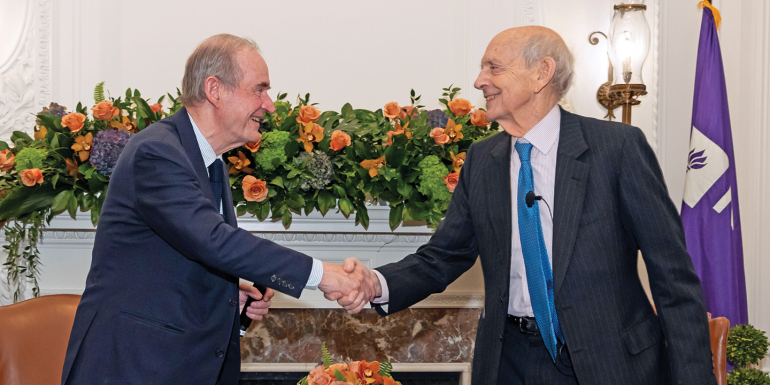Retired justice Stephen Breyer receives Boies Prize at NYU Law

Stephen Breyer, who served on the US Supreme Court from 1994 to 2022, engaged in a wide-ranging conversation on November 7 at NYU Law about the current pressures being exerted on democracies around the world. During his visit, Breyer received the inaugural David Boies Prize in recognition of his commitment to the pursuit of justice and the betterment of society.
The new prize is named for David Boies II LLM ’67, co-founder and chairman emeritus of Boies Schiller Flexner. A nationally renowned litigator, Boies has argued before the Supreme Court in some of its highest-profile cases, including Westmoreland v. CBS, United States v. Microsoft, Bush v. Gore, and Hollingsworth v. Perry. In his remarks at the event, Dean Troy McKenzie ’00 called Boies a lawyer with “exceptional commitment to the pursuit of justice.”

Joining Breyer in his discussion of democracy were Rosalie Abella, former justice of the Supreme Court of Canada, and Samuel Issacharoff, Bonnie and Richard Reiss Professor of Constitutional Law. In his initial remarks, Breyer said that judges aren’t beholden to public opinion when deciding cases, but every judge recognizes “the climate of the era.” The panel discussed clashes between presidents and the US Supreme Court and concerns about the Court’s lack of transparent decision making, including its increasing use of the fast-track procedure known as the shadow docket to produce unsigned orders and decisions without specified reasoning. They also explored differences between Canadian and American constitutional jurisprudence, public perception of courts’ legitimacy, a lessening commitment to precedent, the value of compromise in drafting opinions, and what makes a good judge.
At a luncheon following the panel discussion, McKenzie recalled clerking at the Supreme Court and seeing Breyer in action. “At the highest court in our land, he was someone whose thoughtfulness and energy and care in thinking through cases were extraordinary…. Justice Breyer’s dedication to making the world a better place through his work is an inspiration to all of us,” said the dean.

David Stone, managing director of Stone & Magnanini as well as president of the Smart Family Foundation of New York, whose support established the Boies Prize, shared memories of both Breyer and Boies before inviting the latter to address the audience. Boies deemed Breyer a champion of the rule of law, justice, reason, and commonality.
“No person that I know of…better deserves that enormous power and trust that we give our justices than Stephen,” said Boies, who then presented the award to Breyer. The two proceeded to discuss the duties and challenges facing the judiciary in an informal conversation.
Selected remarks from the morning panel discussion:
Rosalie Abella: “Don’t you find that what seems to be happening with something like the shadow docket is the preservation of a status quo that is harmful rather than the way we learned about what the purpose of an injunction is? And that is to wait until you’ve had a chance for a full hearing, both parties to argue fully, so that you are preserving the least harmful situation until you get to a hearing. I don't know that that’s what’s happening with this shadow docket now.”
Stephen Breyer: “The judge’s power flows from reason, not money, not guns. Okay? Write an opinion.…. One thing that I’ve learned in writing opinions: you think you’re stuck, you think you’ve decided, you think you’re going to stick to what you initially think. No. You don’t always.... I’ve seen [oral arguments] change people. They don’t change so much from A to not-A. But they change quite often in how they see this case, in how they stress this and forget about that.”
Breyer: “Senator [Harry] Reid…came over to the Court for dinner just after Bush v. Gore [the 5-4 decision halting the recount of Florida ballots in the 2000 presidential election]…. He said the most remarkable thing about that case is something that’s rarely remarked. Despite the fact that it affected a lot of people, despite the fact…that the majority, anyway, maybe a few more than a majority, disapproved of the result and thought it was wrong, no paving stones [were] thrown. No bricks. No guns, no riots…. ‘Don’t trash the Court.’ That’s what Gore said. Just as Bush said in [Hamdan v. Rumsfeld, in which the Court invalidated military commissions set up to try Guantanamo Bay detainees]: ‘I don’t agree with the Court, but I’ll do it.’”
Abella: “I was born in Germany in 1946. My parents were in concentration camps.… And I honestly believe that without strong, fearless courts, there’s no hope for democracy anywhere…. I watch from Canada where we have limits to speech, we have restrictions on hate speech. The hate that is coming out of too many parts of the world worries me, and I see the role of the courts in my country to make sure that there are limits to the harm caused by that speech. When you don’t stop it, I think you see the results all around you.”


